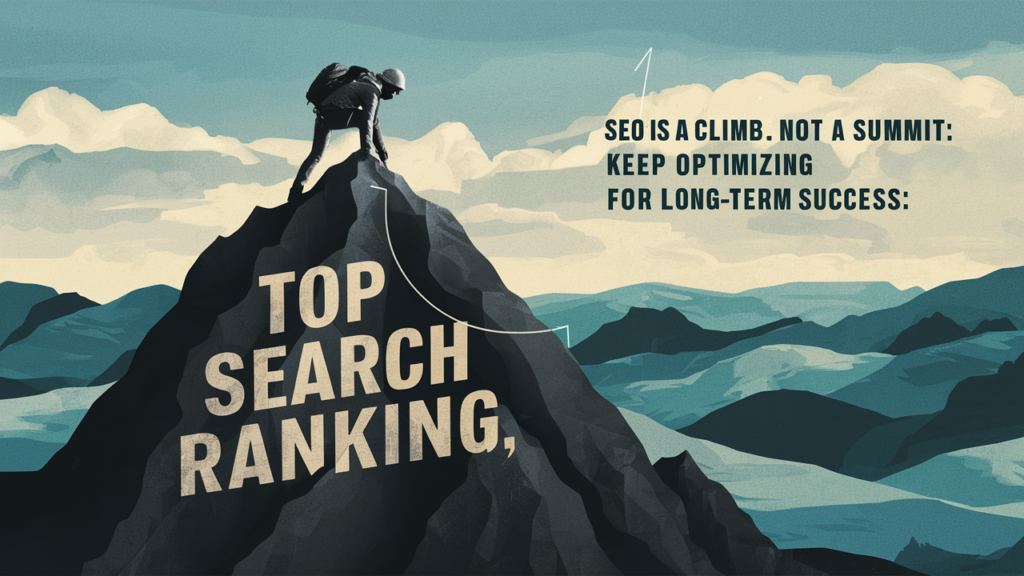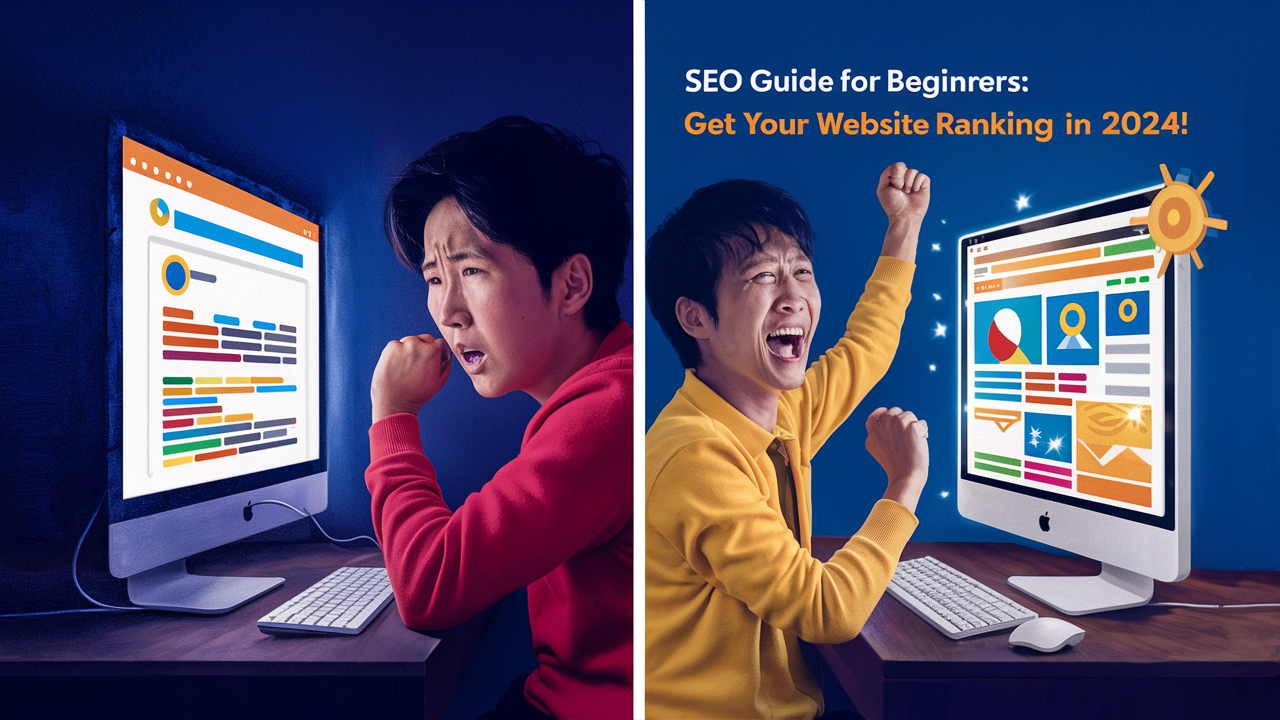Table of Contents
Welcome to the exciting world of SEO (Search Engine Optimization)! Whether you’re a complete beginner or just looking to refresh your knowledge, this guide is here to empower you to take control of your website’s online presence. We’ll break down the basics of SEO in simple terms, equip you with actionable strategies, and help you navigate the ever-evolving SEO landscape in 2024.
What is SEO and How Does it Work?

Imagine a vast library filled with information. Search engines like Google act as the librarians, meticulously organizing and ranking websites based on their relevance and authority. Search Engine Optimization is the art of optimizing your website to be easily found and understood by these search engines, ultimately landing a coveted spot on the first page of search results (SERPs).
By following SEO best practices, you increase your website’s visibility for relevant search queries, attracting organic traffic and potential customers.
Understanding Search Intent:
Before diving into optimization, let’s understand what users are looking for when they search online. People have different goals when they use search engines, and understanding this “search intent” is crucial for effective SEO. Here are the four main types of search intent:
- Informational Queries: Users are seeking answers to questions. (e.g., “What is the capital of France?”)
- Navigational Queries: Users are looking for a specific website. (e.g., “Facebook login page”)
- Transactional Queries: Users are ready to make a purchase. (e.g., “Buy a new laptop online”)
- Commercial Queries: Users are researching before buying. (e.g., “Best laptops for students 2024”)
By tailoring your website content to address specific search intent, you can ensure your website provides the information users are actively seeking.
Building Your SEO Strategy:

A successful Search Engine Optimization strategy is like a well-crafted roadmap. It outlines the steps you’ll take to optimize your website and achieve your SEO goals. Here are some key elements to consider:
- Keyword Research: Identify relevant keywords with good search volume that your target audience is using. Free tools like Google Keyword Planner can help you get started.
- On-Page Optimization: Optimize your website content, including titles, headings, meta descriptions, and images, to naturally include your target keywords.
- Technical SEO: Ensure your website is search engine friendly. This includes aspects like website speed, mobile-friendliness, and a clear site structure.
- Off-Page Optimization: Build backlinks to your website from high-authority websites. Backlinks act like votes of confidence for your content, boosting your website’s ranking.
- Content Marketing: Create valuable and informative content that resonates with your target audience. Content marketing not only attracts visitors but also establishes your website as a trusted source of information.
Best SEO Practices for 2024:
The world of SEO is constantly evolving. Here are some of the best practices to keep in mind for 2024:
- Focus on User Experience (UX): Ensure your website is easy to navigate, visually appealing, and provides a positive user experience.
- Mobile-First Indexing: With the majority of searches now happening on mobile devices, prioritize a mobile-friendly website for optimal ranking.
- Content Quality is King: Create high-quality, informative, and engaging content that addresses user needs and search intent.
- Voice Search Optimization: As voice search becomes increasingly popular, consider optimizing your content for natural language queries.
SEO for Beginners: Essential Tools and Resources

You don’t have to navigate the world of SEO alone! Here are some helpful tools and resources to get you started:
Common SEO Mistakes to Avoid:
Even the best-intentioned SEO efforts can go awry. Here are some common mistakes to avoid:
- Keyword Stuffing: Don’t overload your content with keywords unnaturally. Focus on creating informative content that uses keywords strategically.
- Ignoring Technical : A technically flawed website can hinder your SEO efforts. Ensure your website is mobile-friendly, loads quickly, and has a clear structure.
- Neglecting Backlink Quality: Not all backlinks are created equal. Focus on acquiring backlinks from reputable websites relevant to your niche.
- Copying Content: Duplicate content can hurt your website’s ranking.
- Black Hat Techniques: Avoid manipulative tactics like keyword stuffing or buying backlinks. These practices can harm your website in the long run.
Putting Your SEO Knowledge to Work:
Now that you’re equipped with the SEO essentials, it’s time to take action! Here’s how to get started:
- Identify Your Target Audience: Who are you trying to reach with your website? Understanding your audience will help you tailor your content and keywords.
- Perform Keyword Research: Use free or paid keyword research tools to identify relevant keywords with good search volume and lower competition.
- Optimize Your Website Content: Integrate your target keywords naturally throughout your website content, paying attention to titles, headings, and meta descriptions.
- Focus on User Experience: Ensure your website is easy to navigate and provides a positive user experience for visitors on all devices.
- Build High-Quality Backlinks: Reach out to relevant websites in your niche and explore opportunities to collaborate or have them link to your valuable content.
- Monitor Your Progress: Use SEO tools like Google Search Console and Google Analytics to track your website traffic, ranking positions, and identify areas for improvement.
SEO is a Journey, Not a Destination

SEO is an ongoing process that requires patience and dedication. Don’t get discouraged if you don’t see results overnight. Here are some tips for long-term SEO success:
- Stay Updated on SEO Trends: The SEO landscape is constantly evolving. Stay informed by following SEO blogs and resources.
- Regularly Update Your Content: Keep your website fresh and relevant by regularly updating your content with new information and insights.
- Analyze and Monitor: Regularly monitor your SEO performance and adapt your strategies based on new data and insights.
Remember, SEO is an investment in your website’s long-term visibility and success. By following these steps, consistently producing high-quality content, and adapting your strategies as needed, you can climb the search engine rankings and attract a wider audience to your website.
Frequently Asked Questions (FAQ) on SEO
SEO is a marathon, not a sprint. Seeing significant results can take several months, depending on the competitiveness of your niche and the quality of your SEO efforts.
- Google Search Console: Provides insights into your website’s search performance and technical health.
- Google Keyword Planner: Helps you research keywords and understand search volume.
- Ahrefs Webmaster Tools (Free Version): Offers a limited set of features for backlink analysis and website monitoring.
White hat SEO techniques focus on creating high-quality content and building backlinks naturally. Black hat SEO involves manipulative tactics like keyword stuffing or buying backlinks, which can harm your website in the long run.
There are several ways to improve website speed, such as optimizing images, reducing redirects, and using a caching plugin.
In 2024, a mobile-friendly website is crucial for SEO success. Google prioritizes mobile-friendly websites in search results.
SEO (Search Engine Optimization) focuses on organic search results, meaning you optimize your website to rank higher naturally. SEM (Search Engine Marketing) is a broader term that encompasses both SEO and paid advertising (like PPC ads) to appear at the top of search results.
Internal linking involves linking between pages on your website. This helps search engines understand your website structure and improves user experience.
Schema markup is a code you can add to your website that helps search engines understand the meaning of your content. This can lead to richer search results snippets and potentially improve click-through rates.
There are free and paid tools available to help you identify duplicate content on your website. Once identified, you can either rewrite the content or use a canonical tag to point to the original version.
SEO costs can vary depending on your needs and approach. You can achieve SEO success without a significant budget by focusing on on-page optimization, content creation, and link building strategies. Hiring an SEO professional can be an investment, but the potential return on investment (ROI) can be significant.

